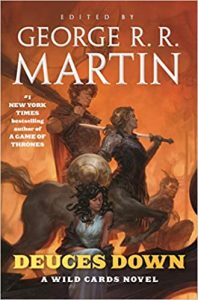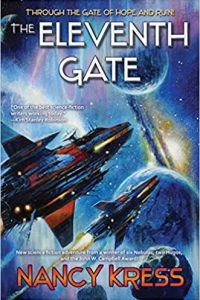Paula Guran Reviews Deuces Down, Edited by George R.R. Martin & Melinda Snodgrass
 Deuces Down, George R.R. Martin & Melinda Snodgrass, eds. (Tor 978-1-250-22720-1, $28.99, 352pp, hc) January 2021.
Deuces Down, George R.R. Martin & Melinda Snodgrass, eds. (Tor 978-1-250-22720-1, $28.99, 352pp, hc) January 2021.
Deuces Down is both the 16th and 30th book in the Wild Cards series. The anthology was first published in 2002; this new version is refreshed with added stories by Carrie Vaughn, Mary Anne Mohanraj, and Caroline Spector. Although referred to on the title page as a mosaic novel, it remains – despite the linking story by Vaughn – an anthology of stories related only by the theme: deuces, folk with minor superpowers in the alternate superhero Wild Cards universe.
If you are unaware of what Wild Cards is, in brief and simplistically: created by George R.R. Martin (first book published in 1987), the Wild Card universe departs from ours in 1946 when an alien virus arrives on Earth. Ninety percent of those who contract it die; the DNA of the ten percent who survive it is altered. Nine percent acquire debilitating mutations and become known as jokers. The remaining one percent, aces, gain unique superpowers. There’s also an uncounted number of those whose powers – like the deuces – vary from those two categories.
These not-quite-aces with minor superpowers, as this compilation proves, still have considerable impact in their fictional world.
Deuces Down starts with the first part of Vaughn’s story “Age of Wonders”, which sets the volume up in June 2003 when Raleigh Jackson, the journalist daughter of an actress – who is an ace, or maybe a deuce – starts diving into the archives of Aces!, a tabloid magazine. She finds unpublished gems – AKA the earlier stories. Vaughn’s episodes also, in some cases, clarify the deuce status of the portrayed characters. “Age of Wonders” continues to frame the stories as, over a period of three years, Raleigh Jackson’s archive-based stories establish her career. She also searches for the identity of her unknown father, finds a boyfriend, handles being a “latent” herself, encounters personal danger, and copes with her mother.
The old stories: John Jos. Miller’s story “Four Days in October” features the 1969 World Series between the Baltimore Orioles and the Brooklyn Dodgers. A young reporter thinks the Dodgers have a secret ace on the roster. “Walking the Floor Over You” by Walton Simons features the Great New York City Blackout of 1977 and Carlotta DeSoto, a comic deuce. Kevin Andrew Murphy’s “With a Flourish and a Flair” is based around a Jokertown band’s emergence via a live performance on MTV. The disappearance of Grace Kelly (evidently a deuce) while starring in The French Lieutenant’s Woman (with Warren Beatty) is featured in Melinda M. Snodgrass’s “A Face on the Cutting Room Floor”. Raleigh also uncovers an unknown first moon landing in 1968, according to Michael Cassutt’s “Storming Space”. Set in 1987, “Father Henry’s Little Miracle” by Daniel Abraham deals with the dangerous ace James Spector – Demise. “Promises” by Stephen Leigh is a poignant story of love and death.
The other two new stories: A couple of deuces deal with a threat from the (heretofore thought gone from Earth) alien Swarm biomass in “Tasty” by Mary Ann Mohanraj, and an evil crime lord conveniently disappears in 1977 in “Dry to the Touch” by Caroline Spector.
It would have been nice if the anthology had been supplemented with an additional introduction, as the 2002 one by Walton Simons referencing the series as “alive and kicking after fifteen years” (it has now been 34 years) does nothing to illuminate the deucedom or set the stage for the stories. Otherwise, Deuces Down provides a look at yet another inventive, interesting aspect of the Wild Cards universe. This volume may not be essential to appreciating the series, but it is certainly entertaining.
Paula Guran has edited more than 40 science fiction, fantasy, and horror anthologies and more than 50 novels and collections featuring the same. She’s reviewed and written articles for dozens of publications. She lives in Akron OH, near enough to her grandchildren to frequently be indulgent.
This review and more like it in the January 2021 issue of Locus.
 While you are here, please take a moment to support Locus with a one-time or recurring donation. We rely on reader donations to keep the magazine and site going, and would like to keep the site paywall free, but WE NEED YOUR FINANCIAL SUPPORT to continue quality coverage of the science fiction and fantasy field.
While you are here, please take a moment to support Locus with a one-time or recurring donation. We rely on reader donations to keep the magazine and site going, and would like to keep the site paywall free, but WE NEED YOUR FINANCIAL SUPPORT to continue quality coverage of the science fiction and fantasy field.
©Locus Magazine. Copyrighted material may not be republished without permission of LSFF.






